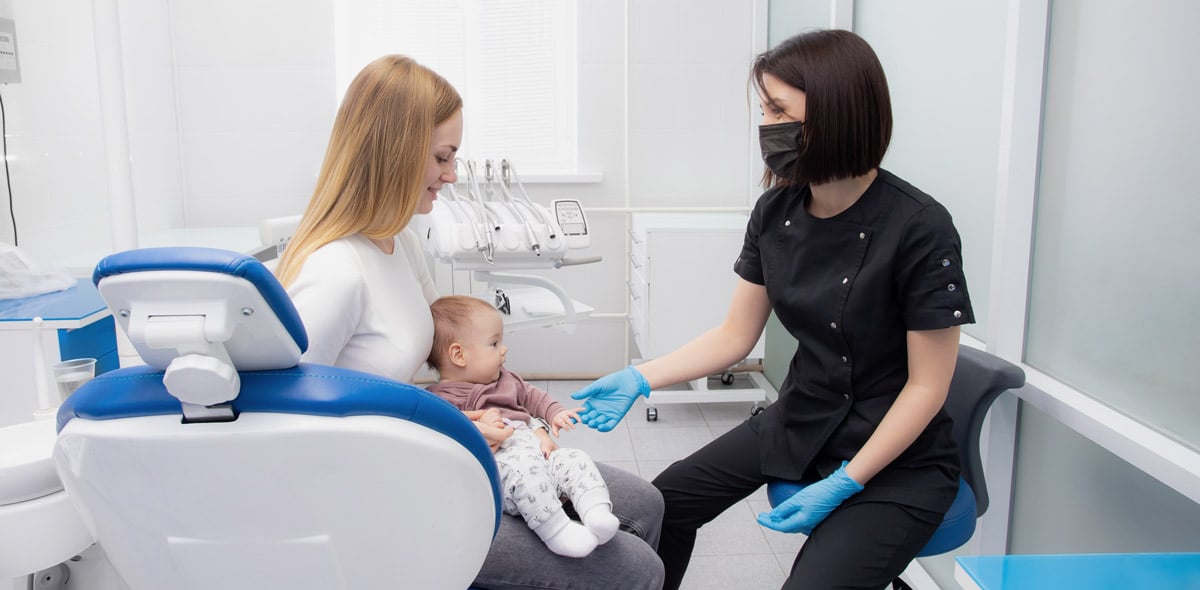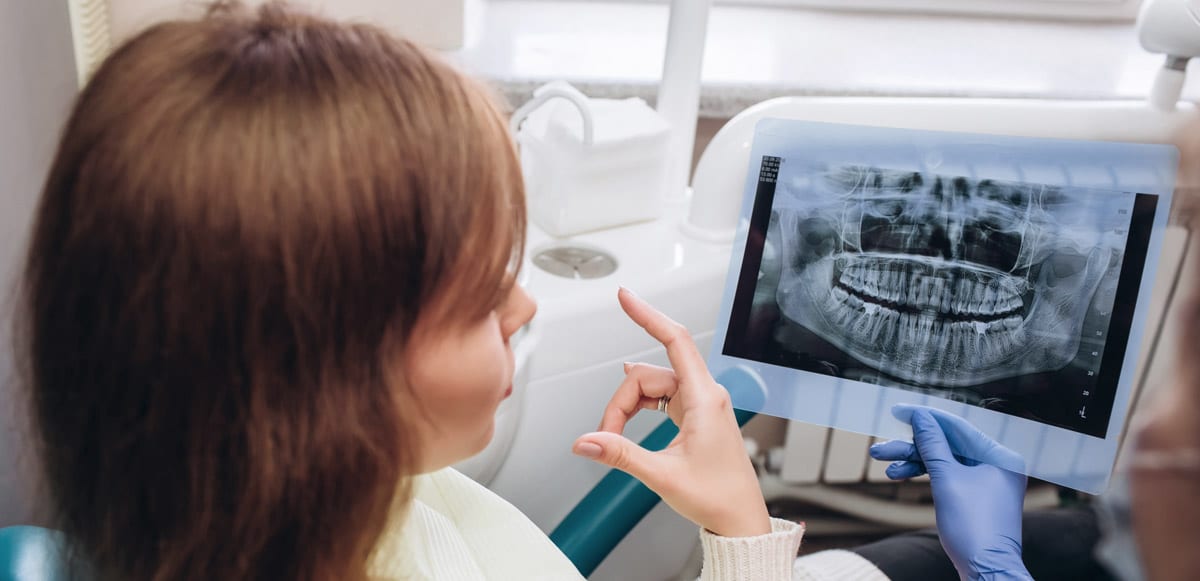Family dental care: tips for maintaining healthy smiles at every age

Maintaining excellent family dental care is crucial for ensuring lifelong oral health for everyone, from infants to seniors.
A proactive dental care routine and regular visits to a family dental practice can help prevent issues such as gum disease, crooked teeth, and tooth decay.
Whether you’re looking for affordable treatments, scheduling a hygienist appointment, or considering options like dental implants and Invisalign, understanding the right approach at each stage of life is essential.
This guide explores how to care for your smile at every age, providing expert advice from dentists and hygienists to ensure optimal dental health for the whole family.
The importance of family dental care
Your teeth and gums undergo significant changes throughout your life, meaning that the way you treat them should evolve, too.
How oral health changes over time
As we age, our teeth, gums, and mouth go through various changes, requiring different levels of care.
Babies need extra help to prevent early decay, while children must develop strong habits to protect their growing teeth.
Teenagers often require orthodontic treatments like Invisalign, and adults may need crowns, bridges, or even dental implants to replace missing teeth.
For seniors, dentures, gum disease prevention, and overall oral health maintenance become key concerns.
By visiting a dentist surgery regularly and maintaining a good oral hygiene routine, the whole family can prevent costly and painful dental emergencies.
Infant and toddler dental care (0–3 Years)
When to start brushing your baby’s teeth
A baby’s first teeth typically appear around six months of age. It is essential to start brushing them as soon as they emerge using a soft-bristled baby toothbrush and a tiny amount of fluoride toothpaste. This prevents decay and builds good habits early on.
Many parents forget that babies can develop cavities, even if they only drink milk. Avoid putting babies to bed with bottles, as prolonged exposure to milk or juice can lead to early childhood decay.
The first dental visit: what to expect
A baby’s first dental appointment should happen by their first birthday or within six months of their first tooth appearing. Many family dental practices in London and across the UK accept new NHS patients, offering free check-ups for children, or you could find a private practice if you would prefer.
During the first visit, a dentist will check your baby’s teeth, gums, and overall oral health, offering advice on proper dental care. Regular check-ups ensure any early signs of gum disease or decay are caught before they become serious issues.
Early childhood dental care (4–7 Years)
Developing good oral hygiene habits
At this stage, children start taking responsibility for their dental care, but supervision is still important. They should brush twice daily with fluoride toothpaste and a soft-bristled toothbrush suited to their age.
Since children may struggle with technique, parents should guide them until they develop the necessary coordination to clean their teeth effectively.
A dental hygienist can demonstrate proper brushing techniques, helping children understand the importance of keeping their teeth clean.
Making oral hygiene fun can encourage consistency. Playing a two-minute song while brushing, using flavoured toothpaste, or creating a reward chart can help.
Common dental issues in children
During this age, children may develop crooked teeth, gaps, or early signs of gum disease. While gaps in baby teeth are normal, severe misalignment may require early orthodontic assessment. Some dentists recommend monitoring tooth development to determine whether orthdontic treatment might be needed in the future.
Cavities are also common, especially with frequent sugary snacks. Encouraging children to drink water instead of fizzy drinks and limiting sweets to occasional treats can prevent decay.
School-age dental care (8–12 Years)
The role of fluoride in strengthening teeth
As teeth develop, fluoride becomes essential in preventing decay. It strengthens enamel, making it more resistant to acid attacks from bacteria and food.
Many family dental practices offer fluoride varnish treatments for children, and parents should ensure their child uses the right fluoride toothpaste. However, excessive fluoride intake should be avoided to prevent dental fluorosis.
Parents unsure about fluoride can discuss it with their dentist, who can explain its benefits.
Orthodontic concerns and early treatments
As permanent teeth emerge, issues like crooked teeth, gaps, or a misaligned bite may develop. Early detection allows for timely orthodontic treatment, making corrections easier. Traditional braces remain a popular choice, but many families opt for Invisalign for a more discreet solution.
An orthodontist assesses alignment through X-rays and examines the bite. In some cases, early interventions like palatal expanders create space for proper tooth development. Advances in orthodontic treatment mean shorter correction times and improved comfort.
Teen dental care (13–19 Years)
Braces vs. Invisalign: a new approach to straightening teeth
Teenagers often feel self-conscious about their smile, making orthodontic options an important consideration. While traditional braces effectively correct crooked teeth, Invisalign offers a nearly invisible solution with clear aligners. These are removable for eating and brushing, making oral hygiene easier, but must be worn at least 22 hours a day to work effectively.
A family dental practice will assess whether Invisalign is suitable based on the complexity of misalignment. For more severe cases, traditional braces may still be necessary.
The impact of diet and lifestyle on oral health
Teenagers often consume sugary foods, fizzy drinks, and energy drinks, increasing the risk of cavities. Encouraging healthier choices, such as drinking water and limiting sweets, helps maintain strong teeth. Smoking and vaping are also concerns, as they contribute to staining, bad breath, and gum disease.
Sports-related dental injuries are another concern. Teenagers playing contact sports like rugby or hockey should wear a custom-fitted mouthguard to protect their teeth. Many family dental practices offer high-quality mouthguards designed for better protection than standard store-bought options.
Adult dental care (20–39 Years)
Preventative dental care for adults
During adulthood, maintaining oral health requires a commitment to daily dental care and regular check-ups. Brushing twice a day with fluoride toothpaste, flossing, and attending routine hygienist appointments help prevent decay and gum disease. Many family dental practices now offer professional cleaning services to remove plaque buildup, ensuring long-term dental health.
For adults with crooked teeth or alignment concerns, orthodontic treatments like Invisalign provide a discreet solution. Those with missing teeth may consider dental implants, which restore both function and appearance. A dentist can explain the best options based on individual needs.
The impact of lifestyle choices on dental health
Diet, smoking, and stress all influence oral health. Sugary and acidic foods increase the risk of cavities, while smoking can lead to gum disease and staining. Drinking water instead of fizzy drinks and limiting coffee can help maintain a healthy smile.
Stress-related habits, such as grinding teeth (bruxism), can cause wear and discomfort. A family dental practice may recommend a custom mouthguard to prevent damage. Regular appointments ensure that any issues are detected early and properly treated.
Middle-aged dental care (40–59 Years)
Addressing common dental problems
As people age, they become more susceptible to issues such as gum disease, receding gums, and tooth sensitivity. Visiting a family dental practice regularly ensures early detection and appropriate treatment. A hygienist appointment can help manage plaque and prevent worsening conditions.
For those with missing teeth, dentures or dental implants provide effective solutions. Dental implants offer a long-lasting, natural-looking alternative to traditional dentures, improving both function and confidence.
The importance of routine check-ups
Routine check-ups help identify potential problems before they become severe. X-rays can detect issues below the surface, while early intervention can prevent the need for extensive dental treatment.
Many dentists now offer affordable tailored treatment plans for private patients, ensuring everyone has access to quality dental care. Those who haven’t seen a dentist in a while should register with a local dental practice to maintain their oral health.
Senior dental care (60+ Years)
Managing tooth loss and replacements
Tooth loss becomes more common with age, but modern dental treatments offer effective solutions. Dental implants, dentures, and crowns can restore function, prevent gaps, and improve appearance. A dentist surgery can explain the best options based on an individual’s needs and budget.
For those unable to tolerate traditional dentures, dental implants provide a stable alternative. Advances in implant technology over the last few years have made them more accessible and affordable.
Preventing gum disease and maintaining oral health
Older adults are at higher risk for gum disease, which can lead to tooth loss if untreated. Regular hygienist appointments and proper brushing techniques help keep gums healthy.
Dry mouth is another common issue, often caused by medication. Drinking water, using sugar-free gum, and avoiding alcohol-based mouthwashes can help. A family dental practice can provide tailored advice on managing dry mouth and maintaining good dental health.
Emergency dental care
Dental emergencies can strike at any time, and knowing how to respond quickly can make all the difference in preserving your oral health. Here are some common dental emergencies and what to do if they occur.
Severe toothache and sudden pain
A severe toothache can indicate decay, infection, or an abscess. If pain is persistent, contact a dentist immediately. Rinsing with warm salt water may help, and over-the-counter pain relief can provide temporary relief. However, avoid aspirin directly on the gums. Without treatment, an infection can spread, leading to more serious issues.
Knocked-out tooth
If a tooth is knocked out, it’s crucial to act quickly. Place the tooth back into the socket or store it in milk or saliva. Seek emergency dental care immediately to improve the chances of saving the tooth. The sooner a dentist repositions it, the higher the chances of success.
Broken or chipped tooth
Accidents or biting hard foods can cause a tooth to chip or break. Minor chips may not cause pain, but larger breaks can expose nerves, causing discomfort. Rinse with warm water and apply a cold compress. A dentist may use crowns, veneers, or bonding to repair the damage, preventing further fractures.
Lost filling or crown
If a filling or crown falls out, the tooth becomes vulnerable to decay. You can use temporary dental cement for short-term protection, but you should visit a dentist quickly. A new filling or crown will restore the tooth, and delaying treatment can lead to further damage.
Abscess and dental infections
An abscess or dental infection is a serious emergency. Symptoms include pain, swelling, and fever. Rinse with salt water for relief, but seek immediate dental treatment. A dentist will drain the abscess or prescribe antibiotics to prevent the infection from spreading and preserve oral health.
Finding emergency dental services in London
For those in London or other major cities, finding emergency dental care is easier due to the availability of 24-hour services.
Private family dental practices also offer emergency care, often with shorter waiting times. If experiencing extreme pain, swelling, or infection, immediate treatment is essential to prevent further complications.
The future of family dental care
Advancements in dental technology
The last few years have seen significant advancements in dental treatments, from digital X-rays to minimally invasive procedures. Many family dental practices now use laser technology for gentle, precise treatment, reducing discomfort and recovery time.
Teledentistry is also becoming more common, allowing patients to access professional advice remotely. This new approach to dental care improves access, especially for those in remote areas.
Encouraging a lifetime of healthy smiles
A strong family dental routine ensures good oral health at every age. By maintaining regular appointments, making informed lifestyle choices, and using the latest treatments, individuals can enjoy a healthy smile throughout their life.
For those seeking a family dental practice, it’s essential to find one that offers a comprehensive range of services and a caring, experienced team. Whether looking for Invisalign, dental implants, or general dental care, prioritising oral health leads to a better quality of life.
Fulham Road Dental – expert care for the whole family
Fulham Road Dental is a renowned dental practice in London, offering comprehensive dental care in a state-of-the-art, patient-focused environment.
With a team of experienced professionals, including paediatric specialists and orthodontists, we are dedicated to providing high-quality treatments for patients of all ages.
Our clinic’s welcoming atmosphere ensures comfort and relaxation, whether for routine check-ups, emergency care, or more complex procedures like dental implants.
With our advanced technology and personalised care, Fulham Road Dental stands out as a trusted choice for families looking for top-notch family dental care in the heart of Fulham.




